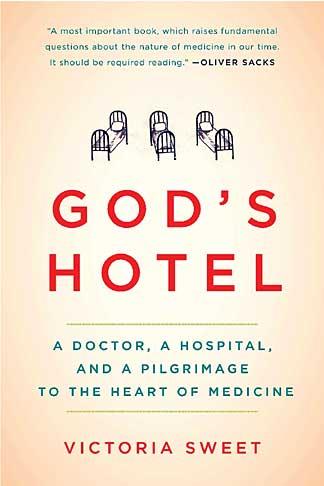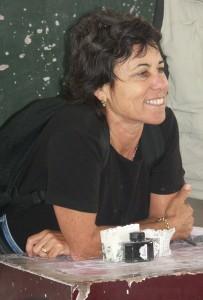 June 1, 2012
June 1, 2012
By Miriam Laufer
Book Critic
Book Review
Laguna Honda Hospital casts a spell. That spell made Dr. Victoria Sweet, who came to work at the hospital for two months, stay for twenty years. That same spell will keep readers turning the pages of her new book, God’s Hotel: A Doctor, A Hospital, and a Pilgrimage to the Heart of Medicine. The “amalgam” of “the ramshackle building” and its patients inspired Sweet to write God’s Hotel, which functions both as a history of the now-demolished former almshouse and a treatise on the practice of what Sweet calls, “slow medicine,” her own amalgam of modern health care and pre-modern medicine.
Sweet, who earned her PhD in medieval medicine while working part-time as a doctor at Laguna Honda in San Francisco, begins with the history of western medicine and the roots of the Hôtel Dieu (God’s Hotel) in the monasteries of the Middle Ages. She relies on the work of Hildegard of Bingen, a medieval German nun, to understand the context of pre-modern western medicine and perhaps explain its sudden demise in the nineteenth century. Hildegard, Sweet explains, took “a gardener’s approach to the body…[manipulating]and [rebalancing]the environment inside of and outside her patient.” Her interest in Hildegard’s practice is not merely academic, however. Sweet finds Hildegard’s conception of the body, based on the four humors (blood, phlegm, black bile, and yellow bile), a “useful heuristic device” for modern medical care.
 The names and other distinguishing features of Sweet’s patients are disguised, but their spirit colors her narrative. Mrs. McCoy, a diabetic alcoholic, is transferred to Laguna Honda with fatal liver failure. Instead of giving up, Sweet decides to try a pre-modern remedy, using an abdominal binder to “press swollen fluid from her belly back into the veins.” The binder gives Mrs. McCoy’s liver enough time to produce the protein that holds the fluid in her veins, and she lives to thank Sweet with a plant that will come to symbolize the old Laguna Honda. While this miraculous result is not always duplicated, Sweet demonstrates how a difference in her thinking can make a big difference in the quality of her patients’ lives.
The names and other distinguishing features of Sweet’s patients are disguised, but their spirit colors her narrative. Mrs. McCoy, a diabetic alcoholic, is transferred to Laguna Honda with fatal liver failure. Instead of giving up, Sweet decides to try a pre-modern remedy, using an abdominal binder to “press swollen fluid from her belly back into the veins.” The binder gives Mrs. McCoy’s liver enough time to produce the protein that holds the fluid in her veins, and she lives to thank Sweet with a plant that will come to symbolize the old Laguna Honda. While this miraculous result is not always duplicated, Sweet demonstrates how a difference in her thinking can make a big difference in the quality of her patients’ lives.
Paul, a powerful six-foot-tall black man, whose legs are amputated due to peripheral vascular disease (one of the many rarer diseases that abound in Sweet’s patients), looks at Sweet “frankly, if irritably, as one deserving Self to another.” Paul’s unspoken demand that she treat him as an equal contributes to Sweet’s extensive reconsideration of the doctor-patient relationship. She notices the difference in spirit at Laguna Honda from other hospitals, as she observes the staff bringing in home-cooked meals, a nurse who volunteers her time weekly to check in on a former patient, and a doctor who buys running shoes so a patient can be discharged. When she sees the doctor buying the shoes earlier in her career, she notes, “it would never have occurred to me” to do that. But when Paul requests a particular vest as a Christmas gift, she buys it for him herself.
However, if there were no villains, this book would never have been written. Politics and a budget crisis ensue. In a series of restructures, Laguna Honda’s medical staff, face time with patients, and food and laundry services are cut, in favor of administrative staff, computerized records, and numerous tests and medications. Amid the hullabaloo, Sweet becomes convinced of the “inefficiency of efficiency.” In one case, she estimates she saved the healthcare system $400,000 with a correct diagnosis of a dislocated hip for a patient who turned out to be unnecessarily medicated for diabetes and dementia. She takes a sabbatical to Switzerland to study Hildegard, and is impressed with Swiss hospitals’ incorporation of Doctors Diet, Quiet, and Merryman, or the importance of good food, rest, and emotional health.
Sweet advocates for more time, more care, and more humanity in the doctor-patient relationship. Her well-articulated argument is made overwhelmingly poignant as she chronicles her experiences with her patients. Future doctors would do well to read God’s Hotel, as would the architects of future health care laws. Her philosophy of slow medicine may inspire a return to certain pre-modern practices without sacrificing modern advances in the way that slow food has brought Americans back into the kitchen, albeit using fancier gadgets.
In the book, the bureaucrats succeeded in demolishing the old Laguna Honda, due to its various violations of the standards of modern health care, but its spirit lives on in Sweet’s memoir. The message of her book is clear: we need more time for doctors and nurses to interact with patients in our hospitals and we need to view Doctors Diet, Quiet, and Merryman as essential to our health as much as pills and procedures. As long as Dr. Sweet crusades, San Francisco still has its almshouse.



